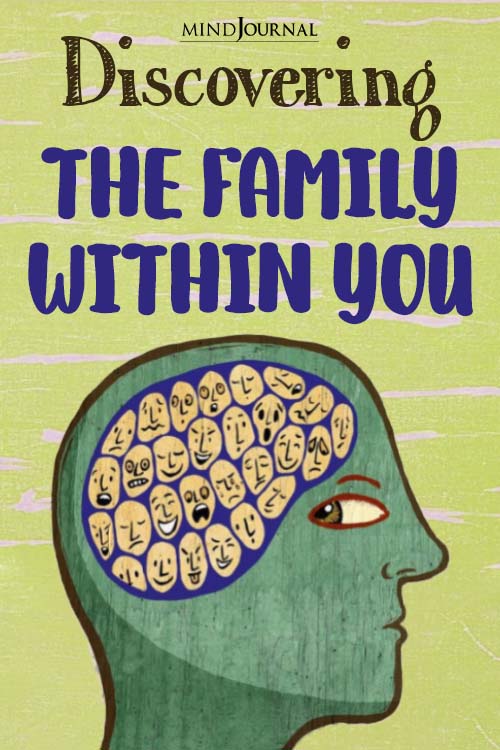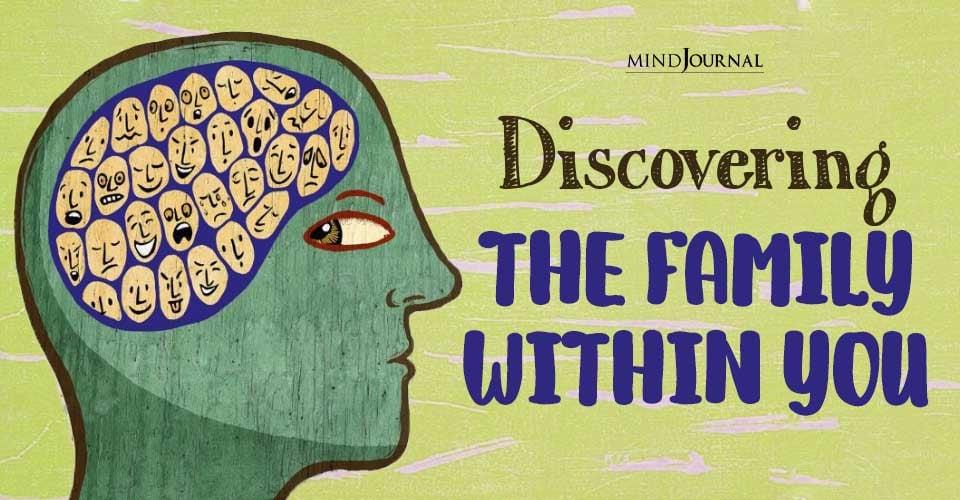Did you know your mind has a family within you? There are “parts” known as sub-personalities that need care, and a wise Self ready to guide and heal. Let’s explore to learn more!
IFS founder Richard Schwartz on the children — and the parents — in our minds.
Key points
- Our minds are naturally made up of “parts” or sub-personalities.
- We also have a Self, a center of calm, clarity, compassion, and connectedness.
- The Self has the ability to parent and heal the other parts.
- Spirituality has negatively construed our parts as aspects of the ego; in fact, they have valuable qualities.
This post is part one in a three-part series.

Your Inner Children: Discover The Family Within You
Richard Schwartz, Ph.D., is the founder of Internal Family Systems (IFS) therapy. Grounded in systems thinking, he began his career as an academic and a systemic family therapist, and he founded his influential school of therapy in response to clients’ descriptions of discovering various voices — or “parts” — within themselves.
Read More Here: The Parentified Daughter: 10 Signs Your Childhood Was Burdened With Responsibilities
A featured speaker for national professional organizations, Dr. Schwartz is the author of many books, including No Bad Parts: Healing Trauma and Restoring Wholeness with the Internal Family Systems Model, You Are The One You’ve Been Waiting For: Bringing Courageous Love To Intimate Relationships, and Many Minds, One Self: Evidence For a Radical Shift in Paradigm. We spoke via Zoom from his home outside Chicago.
Mark Matousek: You’ve written that, “When we simply turn our attention inside, we find that what we thought were random thoughts and emotions comprise a buzzing inner community that has been interacting behind the scenes throughout our lives.” Mostly, we’ve been taught to see the mind as this one big crazy thing, the “mono-mind,” as you put it. How does this belief in the mono-mind hold us back from self understanding?
Richard Schwartz: For me, that’s a big mistake that a lot of spiritual traditions have made — to denigrate what I call “parts” and think of them just as the crazy ego or the monkey mind, or whatever you want to call it, and encourage you not to pay any attention to them and instead to aspire to these much higher levels of consciousness. There’s nothing wrong with that, but you’re sort of abandoning all these inner children in doing that.
Many people can do that and live a decent life, but they’re sort of cut off as a result from a lot of incredibly valuable resources and qualities. A lot of the parts, if they’re ignored long enough, will get revenge somehow in terms of some symptom, either physical or psychological. Having met with many spiritual bypassers, it’s a challenge to get them to actually take these parts seriously, but it’s really important.
MM: You talk about the importance of meeting the capital S “Self,” which you describe as an essence of calm, clarity, compassion, and connectedness. This is necessary for doing this work of integration, since these parts have been interacting inside us without supervision for all of these years and most of them are pretty young. How do we meet this Self part?
RS: Yes, many of us were not raised to actually know about or lead from that place, even though it is in everybody and can’t be damaged and knows how to heal if it’s accessed.
Instead, many of our young parts are forced to become, in a sense, parentified inner children so that they’re forced to lead our lives, but they’re not equipped. They tend to blend with the Self, obscuring it, and then lead your life. A lot of that is what is derogatorily called the ego in spirituality, but it’s just these little guys trying their best.
Many people live their lives without even any awareness that that’s in there, and it isn’t until they actually learn how to separate from these parts that they can see it.
Mindfulness has a version of that. I’m a fan of mindfulness if it didn’t just stop at observing the parts and actually led toward more interaction and loving of them, not just getting them to separate.
Right away, you begin to access these qualities you just mentioned, and this essence that we’re calling the Self with a capital S, because it’s always in there. It’s just covered over, blended with these parts.
MM: Most of mindfulness practice presupposes the mono-mind, however. Could you say more about what you mean by mono-mind?
RS: Our culture basically thinks of us as having one mind with different thoughts and emotions. Also spirituality, as I keep saying, doesn’t see those thoughts and emotions as actually very valuable. In fact, they’re seen as impediments to your spiritual development a lot of the time.
It’s one mind, and if you have these parts, that’s because you’re pathological. That model basically comes out of DID or dissociative identity disorder, what used to be called multiple personality disorder, where what they call alters are the product of trauma.
The one mind was split apart by the trauma, and now you’ve got these shards of the broken vase floating around in there. The goal is to put Humpty Dumpty back together. It’s to round them all up and put them back into one mind, so that you don’t have what I call parts.
That’s the paradigm I’ve been up against as I’ve tried to bring forward this idea of the naturalness of multiplicity — that actually, it’s the nature of the mind to have these sub-personalities, and that they come into the world with us, and they all have valuable qualities and resources. It’s a mistake to think of them as a sign of pathology.
MM: Walt Whitman understood that. “Do I contradict myself?” he wrote. “Very well, I contradict myself. I’m vast, I contain multitudes.” I’m interested in how the Self becomes a parent to the inner parts. You write that even though we weren’t well-parented ourselves, this Self knows how to parent our parts. How can that be possible?
RS: I really don’t really know how, it just is. I still consider myself to be a scientist, and as I was fooling around, this goes back 40 years, I was very lucky back in those days to have failed in a trial of family therapy.
At the time, I was working with bulimic kids, and they started talking about their parts, and how their parts didn’t let them stop, and I didn’t know what the hell they were talking about. And then I got scared. I thought maybe they’re crazier than I thought, because they were talking about these parts as if they had a lot of autonomy, and they had relationships with each other, and then I listened inside myself, and oh my God, I’ve got them too.
Some of my parts are pretty extreme about food, too, and so then I calmed down, and I just started to explore. As I was doing that, and then as a family therapist as I was hearing about this in a patient’s family, I was thinking who’s the leader in there? Is there some kind of good parent available?
When I was having clients explore that — and as I got some parts to open space inside — it was like this other person would pop out suddenly who had those qualities you mentioned earlier of calm and compassion and confidence and curiosity.
There are four other qualities that characterize what I call Self, which include courage and creativity and connectedness and clarity. Those make up the essential qualities of Self, at least the ones that are most relevant to the healing process.
When that person, the Self, would come forward, I could step back as a therapist in a sense because that person would start relating to the other parts in a healing way and a nurturing way.
The clients would respond very differently to it than they did when they were in their other parts. I came to call that the Self with a capital S because when I would ask clients, what part of you is that, they’d say, “That’s not a part like these others, that’s me, that’s my essence, that’s myself.”
It’s an empirical observation that when that is accessed in people, they just know how to be a good inner parent. They do start to ask the parts the right questions, and then in their mind, go to them and hold them and comfort them and even bring them out of where they’re stuck in the past. Most of the parts that we work with became extreme. They were in their naturally valuable states, and then trauma happened.
Then they were forced into these extreme roles and they became frozen back at the time when the trauma happened, and they carry the extreme beliefs and emotions from that time.
The Self starts to heal that by going into the past and bringing the parts into the present and helping them unload these burdens of extreme beliefs and emotions. I don’t have an answer to the question why. I’ve been doing this 40 years and it’s like the same Self shows up in everybody. It’s got the same qualities and knows how to heal.
Stay tuned for Part Two of this conversation.
Read More Here: The Hidden Toll of Childhood Emotional Incest: Identifying Signs and Effects
So will you try to discover the family within yourself? Tell us your thoughts about self understanding in the comments below!
By Mark Matousek
Originally appeared on: Psychology Today










Leave a Reply